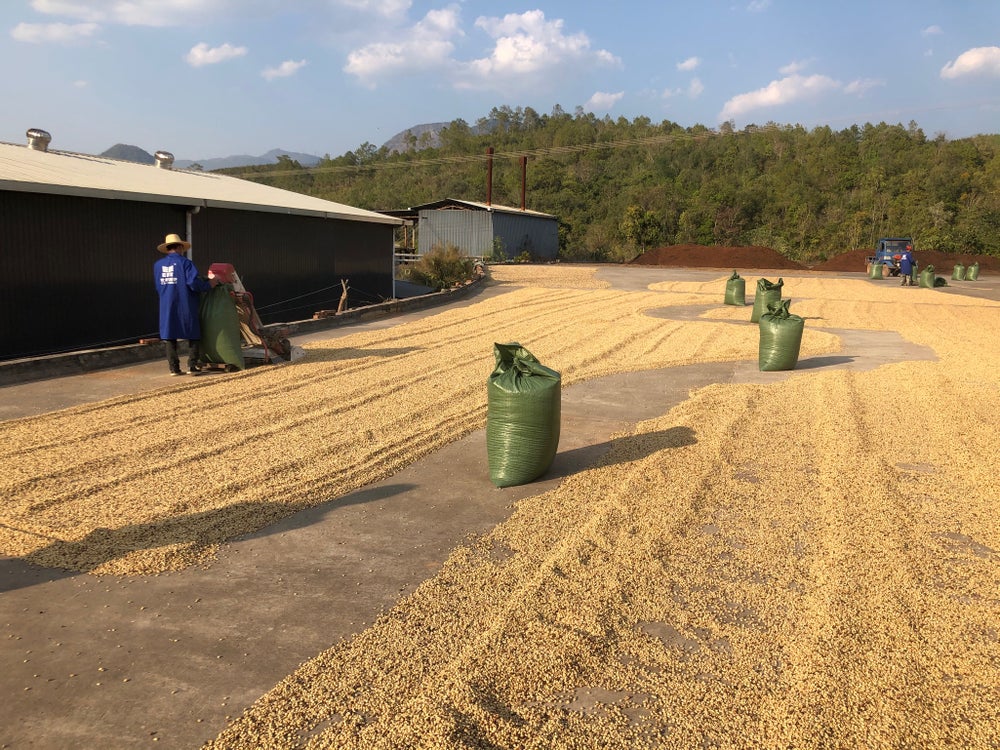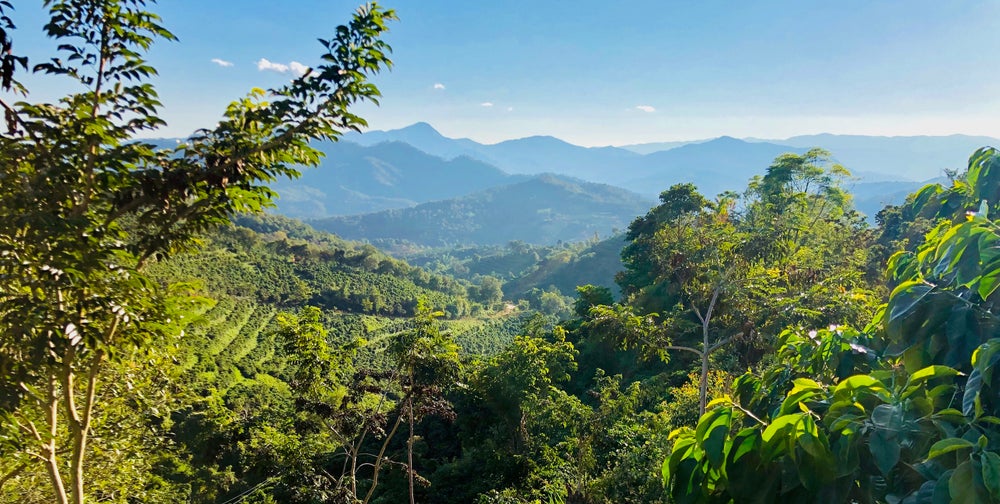

China
The majority of coffee produced in China is grown in the Yunnan Province in western China. Our operations in the country are young, but through our partnerships and our Yunnan-based lab and wet & dry mills, we are able to offer a range of great value coffees that display uniformity and consistent profiles.
Details
- Place In World Production:
- #13
- Average Annual Production:
- 1,050,000 (in 60kg bags)
- Common Arabica Varieties:
- Catimor, Caturra, Typica, SL34
- Key Regions:
- Yunnan (Puer including Menglian, Baoshan, Dehong, Lincang, Xishuangbanna, Dali, Wenshan)
- Harvest Months:
- October - March
Offers
Coffee Beginnings: Yunnan
Coffee has been grown in Yunnan for over a century. The province is historically famous for tea growing, but, over the past three decades, many of the region’s fertile hillsides have been replanted with coffee.
The climate, terroir and geography of Yunnan have long made it an agricultural hub for a wide variety of crops. It is unsurprising, then, that some of the first coffee planted in the country was in the heart of Yunnan in the late 19th century. Missionaries brought coffee plants to rural communities across the province’s green hills. By the 1950s, approximately 4,000 hectares of land in Yunnan were planted with coffee.
Modern production began in the 1990s, when big-name coffee companies began investing in coffee production in Yunnan. Today, coffee is cultivated across some 120,000 hectares, and production is growing rapidly.
Coffee Production Today
Conditions in Yunnan are favorable for coffee. While altitude ranges from 800 to 1,800 meters above sea level, most coffee grows at altitudes between 1,000 and 1,500 meters above sea level.
Today, around 90% of all coffee production from China is Fully washed and sold in parchment to dry mills. Then, the parchment is milled, traded and shipped within 6 months.
Coffee cultivation is centered on 9 cities: Pu’er, Baoshan, Dehong, Lincang, Wenshan and Xishuangbanna. Between them, they produce 95% of the coffee grown in Yunnan.
Specialty Production in Yunnan
The Chinese Government has declared a focus on the production of coffees from Yunnan. In response to a significant rise in both domestic and global coffee consumption, the government is looking to drastically increase national production.
Government-supported investment has impacted both commercial and specialty production. Many farms are seeing organic certification or specialty coffee production as a potential way to increase income from coffee production. To date, there is little-to-no certified Fairtrade (FT) coffee available in Yunnan, though this may be on the horizon.
Early experiments in coffee production were challenged by coffee leaf rust (CLR) and pests, and nearly all early Arabica varieties were replaced with Catimor, a Caturra/Robusta Hybrid. While there are around 30 different varietals being grown in China, Catimor is by far the most popular for its yields and robustness.
This smaller range of genetic diversity in production volume has meant that while specialty coffee production has increased, the majority of specialty coffee grown in Yunnan has featured simple, mild profiles with scores between 80 and 82.
While it is certainly possible to find 83+ coffee growing in Yunnan, domestic markets are so interested in high-scoring coffees—and willing to pay top dollar for Yunnan-grown specialty coffees—that there is not significant incentive to export these high-scoring lots.
Harvest & Post-harvest
Over 90% of coffee in Yunnan in Fully washed. The remainder is processed using the Natural method and a small percentage using the Honey/Semi washed method. Natural processing is usually used for the first coffee harvested, and the majority of Grade 1 coffees are Fully washed.
Most coffee is traded, milled and shipped from December to May. The mills are generally closed during the rest of the year and very little coffee is shipped, as carry-over stock is generally very low.
Pu’er and the surrounding region can be very humid during wet season, and if coffee needs to be stored, it will usually be moved to the city of Kunming. Kunming, at altitudes of 1,900 meters above sea level, has a much better climate for warehousing. Kunming is also capital of Yunnan Province and the hub for exporting.
Harvest typically occurs between December and March. Due to a mixture of the geography of mountainside farms and the financial capacity of the farmers, there is rarely any mechanized picking in China; most cherry is selectively hand-picked. Small farmers rely on household labor to harvest their coffees. Usually only medium and larger producers will hire external labor.
Most producers have their own wet processing facilities; if they do not, they will often sell cherry to middlemen, who can then sell on to wet mills or add value by processing it themselves.
Cherry is mechanically pulped, dry fermented in tanks and then washed. As parchment is washed, it is sent down grading channels that simultaneously wash all parchment and remove any underripe coffee.
After washing, parchment typically dries in multi-level static driers that are fired by coal or wood. Lower grades or excess capacity are dried on patios. Once dry, parchment coffee is sold to commercial dry mills, who then trade the coffee to either export traders, international roasters or domestic roasters. Once coffee has been bought by the commercial mills, traders or middlemen, they are blended into whatever grade they were allocated when purchased.
Traditionally, coffees have been harvested and sold with very little attention applied to lot identification and traceability. Grades have been determined by a combination of screen size and defect counts, rather than by any specific flavor profiles. However, this is beginning to change as specialty coffee evolves in the region.
Sucafina in Yunnan
Sucafina has a lab, office, wet mill and dry mill in the heart of Munaihe, just outside of Pu’er. This small village is where most of the key traders and dry mills in Yunnan are based. We have a small but very experienced team who are committed to delivering coffees to the high quality and ethical standards of Sucafina.
The Yunnan team has worked to develop specific products to represent Yunnan coffees for Sucafina. These products span a quality and value range to allow for a dynamic offering to our clients. In a market where consistency has not always been a focus, we are excited by this opportunity to deliver reliable, quality coffees to our customers.
We have a strong local partnership with a company that enables our in-country financing, logistics and navigation of Chinese trade.
We also looking at China as a destination market and are working on establishing a position within China selling to domestic roasters.
Yunnan is a beautiful part of the world that offers many opportunities for coffees, both as unique offerings as well as making certain blends—such as washed milds—more robust & dynamic. We welcome anyone to come visit & explore what Yunnan has to offer.